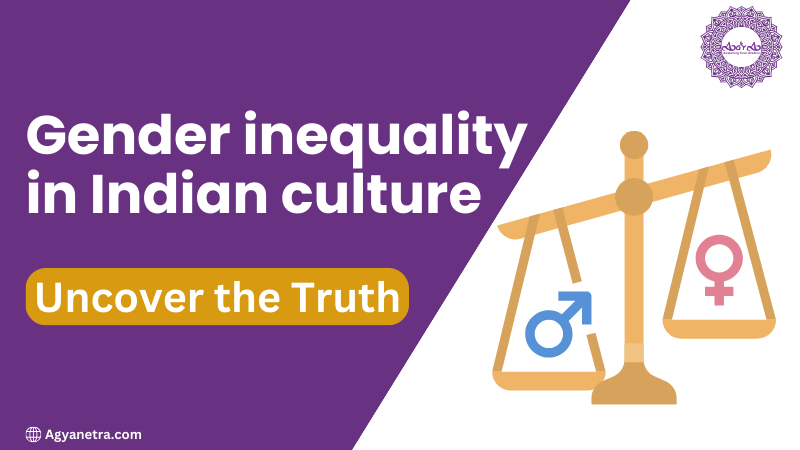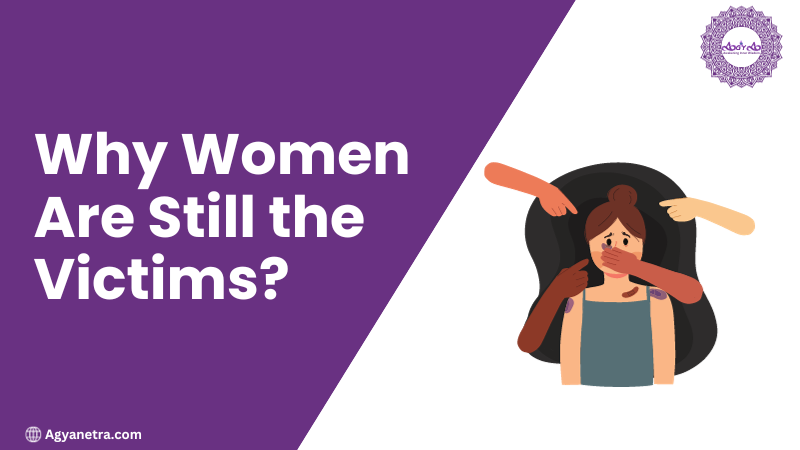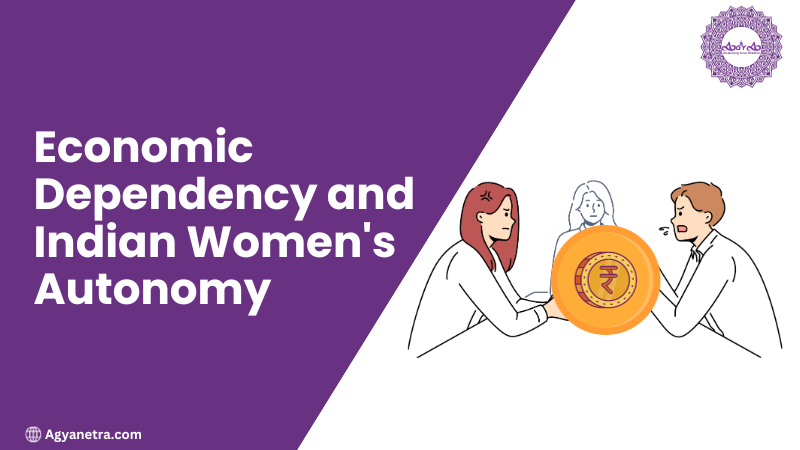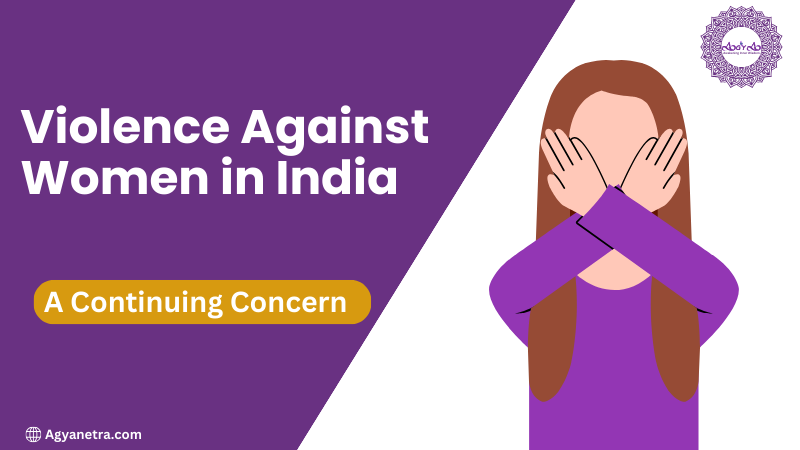Today, we start on a mission to investigate a topic that needs our attention and comprehension: Gender Inequality in Indian Culture. We will unearth layers of traditions, attitudes, and cultural conventions that impact the lives of women in India as we delve into this complex subject.
But there’s more to it than meets the eye, so keep reading to learn more about the rich tapestry of gender dynamics and the constant fight for equality.
Gender inequality in Indian culture: Uncover the Truth
In India, and in several countries, cultures, and religions in general, women have always been perceived as beings who were placed on a pedestal. They are mainly revered for their ‘purity’ and ‘fertility,’ even worshipped, heavily protected, and their status raised from humans to divine beings.

This perspective has imposed numerous boundaries on half of the human species. What the male gender is allowed to do and get away with, the female gender is not, which has placed women in a lower social status in terms of gender equality.
Why Women Are Still the Victims?
In the fast-changing environment of the twenty-first century, where women have knocked down barriers, burst roofs, and etched their names in every area of life, an important question persists: Why Are Women Still Victims? Despite significant improvements, women continue to bear the heavy cost of victimization.

It’s 2023, almost close to 2024, and we have women everywhere: in the military, in schools and colleges, in politics and arts, in jobs and in homes.
Yet, many people ask, “Why do you think women are still the suppressed victims? See, they even have such legal advantages over men. It is just a myth that women are victims anymore. They are instead in a better position.
I simply reply to this with, “Well, almost all women in India have been sexually harassed at one point or another in their lives, experienced inequality in social terms, and have even been made to feel lesser in their workplaces.
They are dominated over after marriage by their counterparts and their families. How many men have faced these challenges on a daily basis? Each day, women face danger and suppression of their individuality due to social conformity.
100% of Indian women have been catcalled or eve-teased at least once in their lives. Do 100% of Indian men go through divorce or alimony cases?
Women are still the victims because ethical, social, and moral crimes against women have been ingrained in our patriarchal mindsets, and we have just learned to live with them.
We don’t tell a man to move to his wife’s house even if she earns as much as him. Even then, it is she who has to move, change her name, serve his family, earn, do the housework, look after kids, and stay away from her own birth family.
The inequalities in India regarding gender standing have now given rise to a new generation of women who have started questioning the one-sided mindset, no longer choosing silence over respect.
Economic Dependency and Indian Women’s Autonomy
Even today, most Indian women depend economically on their parents, families, husbands, extended families, or general male relatives like brothers or sons. The women who earn money also largely depend on the males in their family to manage their finances. Most properties in India are still bought and sold by men.

The financial control in the family is exercised by men. Most women aren’t “allowed” to earn at all, or even if they do, it is not sufficient for them to lead an independent and decent life.
This economic dependency prevents women from achieving autonomous independence or making decisions about their lives. Women cannot live on their own terms because they don’t have the means to do so.
Women are brought up and shaped in a way where they don’t give much thought to earning their own living and gaining the voice that comes with financial well-being.
Female Feticide in India: A Lingering Issue
Though the sex ratio in India has improved over the last few decades, it won’t be wrong to say that in various parts of India, both urban and rural, many girl babies are killed either before or shortly after their birth just because they are girls.
The obsession for a son is still prevalent in India, and people continue to have multiple babies just to have a boy.
The belief that sons are assets while daughters are liabilities, that sons don’t need as much care, protection, or financial support, persists even after their marriage. Not to mention the dowry system still followed in India, where grooms and their families receive cash and various gifts in the wedding from the bride’s family.
The name and lineage are carried on by men. It wouldn’t be wrong to assume that a boy baby is considered an advantage by many parents and families in India.
Violence Against Women in India: A Continuing Concern
In the middle of India’s busy streets and vivid colours, a sorrowful truth spreads a long shadow—a tragic story that speaks to the ongoing struggle against violence against women.

The fear is a harsh and unavoidable reality in 2023. Despite development in several areas, the safety and security of women in India remains an issue that requires constant attention.
Be it sexual crimes, domestic violence, or other physical crimes, women have always been more vulnerable due to their lesser physical strength.
Even in 2023, women and girls try their best to return home before it gets too late, and feminism in India still doesn’t have any answer to this.
These crimes against women have consistently impacted women’s education, freedom, career, and personal growth in a negative manner, limiting their life opportunities.
You may also like: Love’s Unexplored Path: A Journey of Fear and Courage
Social Dominance and Women’s Voices in India
As men hold power in politics, courts, jobs, marriages, homes, and finances due to the patriarchal setup, women automatically become secondary in the social dynamics.
With fewer numbers and lesser hierarchical authority, women have less influence, and their voices are not taken as seriously in various aspects.
Daughters and sisters are expected to obey fathers, uncles, and brothers, wives are supposed to defer to their husbands as the heads of the household, and mothers are expected to agree with their adult sons.
Even in households, the final say in important matters, especially those concerning money or major events, typically lies with the men of the family, leaving little room for women to have a substantial opinion.
Gender Bias in Education and Career Opportunities in India
Indians are biased towards having a boy child, treating him as an asset and support in old age. Many families invest more in the education of their boys, while girls don’t receive equal resources, especially in rural parts of India where girls are often married off at a young age.
Instead of providing proper education, many parents save money for their daughters’ dowries, as marriage is still seen as the primary way for a woman to achieve stability rather than becoming financially independent, as is the case for men.
Education, career, and financial success bring power and influence, and a smaller percentage of women in India are able to achieve it. Moreover, many industries, whether private or public, still prefer male candidates over women due to various biological and socio-economic factors.
The primary role for an Indian woman, whether she earns or not, still often revolves around being a wife, mother, and daughter-in-law, by which she is judged.
Read More: Does true love exist?
Conclusion
Feminism in India over the past two decades has brought significant change to the rampant patriarchal system. Despite the progress, the underlying sexism in this country remains evident.
True equality still exists mainly in conversations and on paper, but at the grassroots level, women in India still lack the autonomy they deserve as fellow human beings.
The silver lining is the current and upcoming generation of women who are slowly but steadily raising their voices, challenging patriarchal norms, and achieving their dreams despite the obstacles.
Women, more than their gender, are humans, just like men, and they deserve equal power, rights, and responsibilities.
FAQs
Why are Indian women still not as progressive as women in the west?
The socio-religious patriarchal environment in India brings up their daughters in a way where they are taught right from their childhood that it is bad to be selfish for women, to think solely about their independence and career and a good life full of dreams and hobbies. Instead they’re told to mostly concentrate on their academics, be submissive so that they can “win” a nice man as a husband and settle down. Unlike women in the west who seem more in independent decisions and life, Indian women are brought up being taught that their motive in life is to live for other sat the cost of their own-selves.
Why even in 2023 India largely remains a patriarchal nation?
Most countries in the world, not just India are still heavily patriarchal. India seemsmore influenced by it due to general socio-economic and religious conditions that have been practiced since centuries and lack of education led to people being stuck still in various illogical belief systems, especially in the lesser educated strata in society.
Why women are still the target of rampant misogyny?
One of themajor reasons why women still remain the victim is due to lack of unity. It is not the men but the women who are the flag-bearers of patriarchy in India who support the sabotage of their own gender just because it is how its supposed to be. There are several women who believe just because they were oppressed and wrong by these practices the younger women deserve it all to because that is how things are since the beginning, denying to put an end to these practices strongly in their sons and daughters upbringing.
How can individuals contribute to challenging patriarchal mindsets in their communities?
By fostering open dialogues, supporting women’s empowerment initiatives, and advocating for gender equality, individuals can play a crucial role in challenging patriarchal norms.
What role does education play in addressing gender inequality?
Education is pivotal in challenging gender norms, empowering women, and fostering a more equitable society.
How does economic dependency affect women’s autonomy in Indian society?
Economic dependency can limit women’s ability to make independent choices about their lives, as they may be beholden to those who provide for them financially.
What are some ways to enhance women’s safety in India?
Strategies include improved law enforcement, increased public awareness, women’s self-defense programs, and promoting gender sensitivity in communities.

Vidushi Gupta is a certified spiritual coach, energy healer, and emotional wellness counselor with over 10 years of experience guiding people through spiritual signs, emotional healing, and inner transformation. Her approach is grounded, fear-free, and focused on helping readers understand spiritual experiences with clarity and emotional balance.
With a background as a digital content strategist and published author of nearly ten novels, Vidushi has reached over 20 million readers worldwide through her writing. She is known for explaining complex spiritual ideas in simple, relatable language, making topics like repeating signs, intuitive shifts, and spiritual awakenings easier to understand and trust.
Through her work, she helps people connect everyday life experiences to deeper inner growth—gently, honestly, and without superstition.
Accuracy, Fact-Checking & Expert Oversight: Vidushi Gupta.
